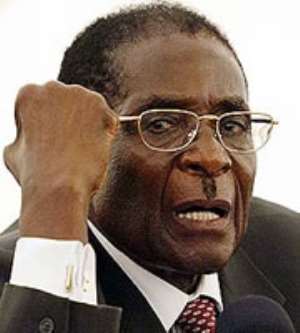
African Union (AU) leaders are gathering in Egypt for a summit which seems set to be overshadowed by the crisis in Zimbabwe.
Zimbabwean President Robert Mugabe has arrived for the meeting, fresh from winning the election there.
He was sworn in on Sunday, but election observers said pre-poll violence had undermined the vote's credibility.
There have been calls for the AU not to recognise Mr Mugabe, but it may urge talks with the opposition instead.
Mr Mugabe claimed a landslide victory as the sole candidate after the leader of the opposition Movement for Democratic Change (MDC), Morgan Tsvangirai, withdrew.
The head of a 400-person observer mission from the Southern African Development Community (Sadc), Angolan Sports Minister Jose Marcos Barrica, was quoted as saying: "The pre-election phase was characterised by politically-motivated violence, intimidation and displacements."
Another observer team, from the Pan-African Parliament, has called for fresh elections to be held, saying the vote was not free or fair.
Call for dialogue
The AU has a rule not to accept leaders who have not been democratically elected - but observers say it is unlikely to take such strong action so quickly.
Zimbabwe's opposition wants neighbouring countries to persuade Robert Mugabe to step down. So how are relations changing?
"It will be none of this summit's business to choose the titles for leaders, it is the business of this summit to see what we are going to do for the suffering people and masses in Africa," Tanzanian Foreign Minister Bernard Membe said at a media briefing, when asked if he would address Mr Mugabe as president.
A draft resolution written by African foreign ministers during talks ahead of the summit in Sharm el-Sheikh did not criticise the elections or Mr Mugabe, but condemned violence in general terms and called for dialogue.
African leaders are expected to urge Mr Mugabe to enter into talks with Mr Tsvangirai, and engage in some sort of power-sharing agreement.
South African President Thabo Mbeki, the regionally-appointed mediator for Zimbabwe, has called for a negotiated solution.
On the eve of the summit, Zambian President Levy Mwanawasa was rushed to hospital in Sharm el-Sheikh suffering chest pains.
Mr Mwanawasa, who is said to be in a stable condition, has taken a tough line against Mr Mugabe's regime, calling the election undemocratic.
Spoilt ballots
Zimbabwe's opposition has called on the AU to take a greater role in mediating the crisis.
MDC Vice President Thokozani Khupe said the AU should send a dedicated envoy to Zimbabwe as well as peacekeepers to halt the violence.
Mr Mugabe was sworn in during a quickly convened ceremony on Sunday, about an hour after the Zimbabwe Electoral Commission announced the results of the presidential election run-off.
The commission said Mr Mugabe won 85.5% of the vote, but many ballots were spoiled.
In a speech that followed the swearing-in ceremony, Mr Mugabe said he was committed to talks with the opposition to find a solution to the political crisis.
However, BBC Southern Africa correspondent Peter Biles says the opposition may reject any notion of a government of national unity in which Mr Mugabe is still in a key position.
The MDC said some 86 of its supporters were killed and 200,000 forced from their homes by militias loyal to the ruling Zanu-PF party in the weeks preceding the run-off.
The government has blamed the MDC for the violence.
The 84-year-old Mr Mugabe has been in power since Zimbabwe gained independence from Britain in 1980.




 Whoever participated in the plunder of the state must be held accountable – Jane...
Whoever participated in the plunder of the state must be held accountable – Jane...
 A vote for John and Jane is a vote to pull Ghana from the precipice of destructi...
A vote for John and Jane is a vote to pull Ghana from the precipice of destructi...
 I’ll repay your abiding confidence with loyalty, understanding and a devotion to...
I’ll repay your abiding confidence with loyalty, understanding and a devotion to...
 ‘I’ve learnt deeply useful lessons for the future' — Serwaa Amihere breaks silen...
‘I’ve learnt deeply useful lessons for the future' — Serwaa Amihere breaks silen...
 I’m sorry for the embarrassment – Serwaa Amihere apologises for leaked sex video
I’m sorry for the embarrassment – Serwaa Amihere apologises for leaked sex video
 Dumsor: Matthew Opoku Prempeh not in charge of Energy sector – Minority
Dumsor: Matthew Opoku Prempeh not in charge of Energy sector – Minority
 Adu Boahen’s murder: Police arrest house help who was in possession of deceased’...
Adu Boahen’s murder: Police arrest house help who was in possession of deceased’...
 Akufo-Addo nominates Felicia Attipoe as Tema West MCE
Akufo-Addo nominates Felicia Attipoe as Tema West MCE
 Election 2024: I can't have someone I defeated twice as my successor – Akufo-Add...
Election 2024: I can't have someone I defeated twice as my successor – Akufo-Add...
